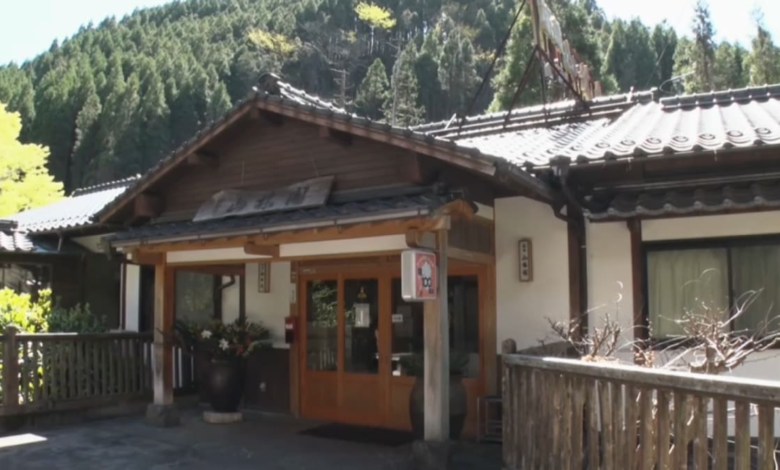Gaia Series 36: Can Japan’s Hot Spring Inns Be Protected?

Facing survival challenges, Japan’s onsen ryokans innovate to preserve their heritage.
Nestled in Japan’s verdant landscapes, onsen ryokans – traditional hot spring inns – stand as serene bastions of tradition, offering tranquil retreats from the modern world’s hustle. Yet, beneath their calm exterior lies a tale of struggle and adaptation in the face of modernity and changing societal needs.
There are around 2,900 hot springs in Japan, making it known as “The Onsen Country”. The top ryokans attract both locals and tourists. However, one-third of these hot spring inns are in decline, struggling with debts and facing closure.
Many belong to ageing proprietors, such as Minobu Akiyoshi, the owner of Sanrinkaku Ryokan in Kyoto’s Oguni Town. At 90 years old, Akiyoshi finds himself too old to operate the hot springs, and his children do not wish to continue the business. Yet, when he puts it on the market for sale, there aren’t any buyers.
This problem is emblematic of the challenges these traditional Japanese inns, known for their hospitality, intricate cuisine, and communal baths, are facing today. Onsen business associations across the country are trying to tackle the issue. The Shima Onsen Association in Gunma, for example, has come up with several initiatives to stall declining tourist figures.
One of the most innovative strategies pursued by the Association was to separate food and lodging services, moving away from the conventional model where Ryokans provided both accommodations and meals. This pivot aimed not only to reduce the operational burden on the ryokans, many of which struggled with staffing and the complexities of providing gourmet dining experiences but also to stimulate local economies by encouraging guests to dine at local restaurants.
It also came up with educational initiatives and sought to enrich visitors’ experiences by deepening their understanding of the onsen’s history, its therapeutic properties, and the natural wonders surrounding Shima Onsen. Through these efforts, the Association not only aimed to attract more visitors but also to create a more engaging and meaningful experience that would encourage repeat visits and word-of-mouth recommendations.
The episode then zooms in on the quiet town of Yunotsuru Onsen in Kumamoto, which has a rich history that spans over 700 years. Despite its legacy, the town has seen a decline, mirroring a national trend where many ryokans struggle to find successors, burdened by Japan’s ageing population and shifting tourism patterns.
At its peak in 1975, the once-bustling Yunotsuru Onsen was home to 10 ryokans and 14 shops. Today, only five inns and three shops are still operational, a reflection of the broader challenges faced by these cultural icons.
Central to this tale is Nagano Onsen, a ryokan with roots stretching back to 1919. Closed for 15 years, its revival hinges on the aspirations and actions of the younger generation, represented by individuals like Yuuki Kubota.
Kubota, who recently left a major real estate company, is determined to breathe new life into Nagano Onsen. The 28-year-old entrepreneur intends to blend modern sensibilities with the ryokan’s rich heritage, aiming for a renovation that respects tradition while appealing to contemporary tastes. The proposed changes include modern Japanese design elements and a business model that offers flexibility and accessibility to a broader audience, including solo travellers.
His vision extends beyond mere business – it’s about reviving a community and preserving a cultural heritage. When his bank loan to restart the business is finally approved, he says, “I’ve come this far. But this is just the beginning,” highlighting his resolve and optimism.
The Minamata City government has taken an active role in preserving these cultural treasures through a unique matching tour initiative, connecting potential buyers and inheritors with onsen ryokans in need of rejuvenation. This innovative approach seeks to address the succession crisis by facilitating new ownership and fresh ideas, potentially setting a precedent for other regions facing similar challenges.
Across Japan, similar stories unfold as communities and individuals rally to preserve the onsen ryokan tradition. These efforts are more than just business ventures; they are acts of cultural preservation, intergenerational responsibility, and love for a way of life that has enchanted many.
As Japan’s onsen ryokans face an uncertain future, the resolve of individuals like Kubota and the support of communities offer a beacon of hope. They represent a bridge between the past and the future, embodying the belief that some traditions are worth fighting for. The story of Japan’s onsen ryokans is evolving, and perhaps, through dedication and innovation, a new dawn awaits these havens of hospitality.

